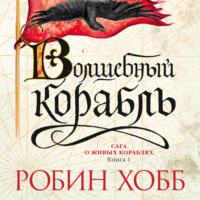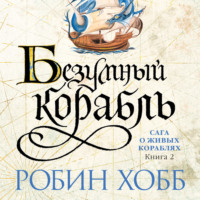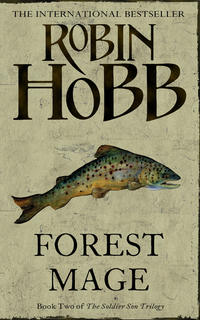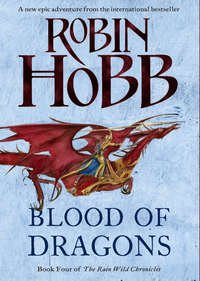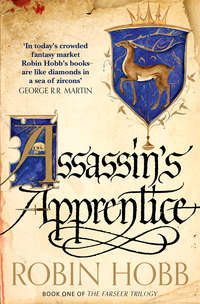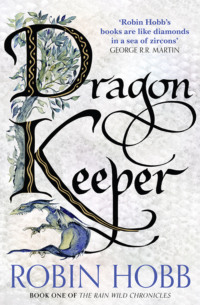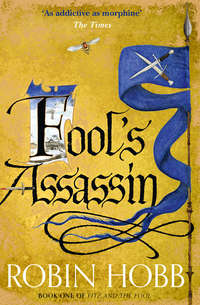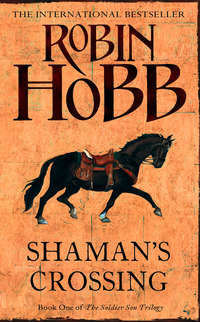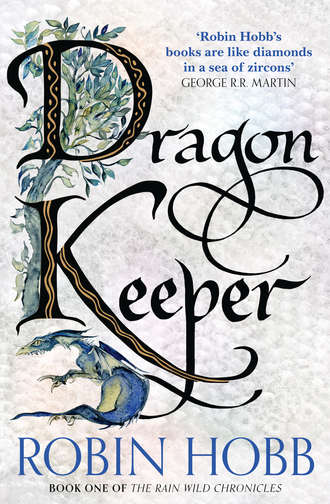
Полная версия
Dragon Keeper
‘Not all of them,’ her father observed sadly. ‘Look down there, Thymara. Tell me what you see.’
From this higher vantage point, she had a wider view of the hatching grounds. She estimated that a fourth of the wizardwood logs would never release young dragons. The dragons that had hatched were already sniffing at the failed cases. As she watched, one young red dragon hissed at a dull case. A moment later, it began to smoke, thin tendrils of fog rising from it. The red set its teeth to a wizardwood log and tore off a long strip. That surprised Thymara. Wizardwood was hard and fine-grained. Ships were built from it. But now the wood seemed to be decaying into long fibrous strands that the young dragons were tearing free and eating greedily. ‘They are killing their own kind,’ she said, thinking that was what her father wished her to see.
‘I doubt it. I think that in those logs, the dragons died before they could break free of their cases. The other dragons know that. They can smell it, probably. I think something in their saliva triggers a reaction to soften the logs and make them edible. Probably the same reaction that makes the logs break down as the youngsters are hatching. Or maybe it’s the sunlight. No, that wasn’t what I was talking about.’
She looked again. Young dragons wandered unsteadily on the clay beach. Some had ventured down to the water’s edge. Others clustered around the sagging cases of the failed dragons, tearing and eating. Of the deer that Tintaglia had brought and of the dead hatchling, scarcely a smear of blood remained. Thymara watched a dragon with stubby forelegs sniffing at the sand where it had been. ‘He’s badly formed.’ She looked at her father. ‘Why are so many of them badly formed?’
‘Perhaps …’ her father began but before he could speak on, Rogon dropped down from a higher branch to join them. Her father’s sometime hunting partner was scowling.
‘Jerup! You’re unharmed then! What were you thinking? I saw you down there and saw that thing go for you. From where I was, I couldn’t see if you’d made it up the trunk or not! What were you trying to do down there?’
Her father looked down, half smiling, but perhaps a bit angry as well. ‘I thought I could help the one that was being attacked. I didn’t realize it was already dead.’
Rogon shook his head contemptuously. ‘Even if it wasn’t, there would be no point. Any fool could see it wasn’t fit to live. Look at them. Half of them will be dead before the day is out, I should think. I had heard rumours that the Elderling boy was concerned something like this might happen. I was just over at the dais; no one knows how to react. Selden Vestrit is visibly devastated. He’s watching, but not saying a word. No music playing now, you can bet. And half of those important folks clutching scrolls with speeches on them won’t give them now. You never saw so many important people with so little to say. This was supposed to be the big day, dragons taking to the skies, our agreement with Tintaglia fulfilled. And instead, there’s this fiasco.’
‘Does anyone know what went wrong?’ Her father asked his question reluctantly.
His friend tossed his wide shoulders in a shrug. ‘Something about not enough time in the cocoons, and not enough dragonspit to go around. Bad legs, crooked backs – look, look at that one there. It can’t even lift its head. The sooner the others kill it and eat it, the kinder for it.’
‘They won’t kill it.’ Thymara’s father spoke with certainty. She wondered how he knew it. ‘Dragons don’t kill their own kind, except in mating battles. When a dragon dies, the others eat them. But they don’t kill one another for food.’
Rogon had sat down on the tree limb next to her father. He swung his bare callused feet lazily. ‘Well, there’s no problem that doesn’t benefit someone. That’s what I was coming to talk to you about. Did you see how quickly they ate that deer?’ He snorted. ‘Obviously they can’t hunt for themselves. And not even a dragon like Tintaglia can possibly hunt enough to feed them all. So I’m seeing an opportunity for us here, old friend. Before this day is out, it’s going to dawn on the Council that someone has to keep those beasties fed. Can’t very well leave a hungry little herd of dragonlings running wild at the base of the city, especially not with the excavation crews going back and forth all the time. That’s where we come in. If we approach the Rain Wild Council to hire us to hunt to feed the dragons, they’ll be no end of work for us. Not that we could keep up with the demand, but while we can, the pay should be good. Even with the big dragon helping us kill for them, we’ll quickly run short of meat animals for them. But for a while, we should do well.’ He shook his head and grinned. ‘I don’t like to think of what will happen when the meat runs out. If they don’t turn on one another and eat their kin, well, I fear that we’ll be the closest prey. These dragons were a bad bargain.’
Thymara spoke. ‘But we made a deal with Tintaglia. And a Trader’s word is his bond. We said we’d help Tintaglia take care of them if she kept the Chalcedeans away from our shores. And she has done that.’
Rogon ignored her. Rogon always ignored her. He never treated her as badly as some of the others did, but he never looked directly at her or replied to her words. She was accustomed to that. It wasn’t personal. She glanced away from the men, caught herself cleaning her claws on the tree’s bark, and stopped. She looked back at them. Her father had black nails. So did Rogon. Sometimes it seemed such a small difference to her, that her father had been born with black nails on his hands and feet and that she had been born with claws, like a lizard. Such a small difference on which to base a life-or-death decision.
‘My daughter speaks the truth,’ her father said. ‘Our Council agreed to the bargain; they have no choice but to live up to it. They thought their promise to aid the dragons would end with the hatching. Obviously, it isn’t going to.’
Thymara resisted the impulse to squirm. She hated it when her Da forced his comrades to acknowledge her existence. It was better when he allowed them to ignore her. Because then she could ignore them as well. She looked aside and tried not to listen to the men as they discussed the difficulties of hunting enough meat to feed that many dragons, and the impossibility of simply ignoring the newly-hatched dragons at the base of the city. There were ruins beneath the swampy grounds of Cassarick. If the Rain Wilders wanted to excavate them for Elderling treasure, then they’d have to find some way to keep these young dragons fed.
Thymara yawned. The politics of the Rain Wild Traders and the dragons would never have anything to do with her and her life. Her father had told her that she should still care about things like that, but it was hard to force herself to be interested in situations she would never have a say in. Her life was apart from such things. When she considered her future, she knew she was the only one she could ever rely on.
She looked down at the dragons and suddenly felt queasy. Her father had been right. And Rogon was right. Below her, young dragons were dying. Their fellows were not killing them, though they did not hesitate to ring the ones that had collapsed, eagerly waiting for them to shudder out a final breath. So many of them, she thought, so many of the hatched dragons had emerged unfit to face the harsh conditions of the Rain Wilds. What had gone wrong? Was Rogon right?
Tintaglia paid another swooping visit. Another carcass plummeted from above, narrowly missing the young dragons that had gathered at her approach. Thymara didn’t recognize the beast she had dropped. It was larger than any deer she had ever seen and had a rounded body with coarse hair. She glimpsed a thick leg with a split hoof before the mob of dragons hid it from her view. She didn’t think that was a deer; not that she had seen many deer. The swampy tussocks that characterized the forest floor of the Rain Wilds were not friendly to deer. One had to journey days and days to get to the beginning of the foothills that edged the wide river valley. Only a fool hunted that far from home. Such hunters consumed food on the way there, and had to eat from their kill on the way back. Often the meat that survived the journey was half spoiled, or so little of it remained that the hunter would have been better off to settle for a dozen birds or a good fat ground lizard closer to home. The dropped creature had a glossy black hide and a big hump of flesh on its shoulders and wide sweeping horns. She wondered what it was called and then a brief touch of dragon mind told her. Food!
A rising note of anger in Rogon’s voice drew her unwilling attention back to the men’s conversation. ‘All I’m saying, Jerup, is that if those creatures don’t get up on their legs and learn to fly and hunt for themselves within the year, they’ll either die or become menaces to folk. Bargain or no, we can’t be responsible for them. Any creature that can’t feed itself doesn’t deserve to live.’
‘That wasn’t the bargain we struck with Tintaglia, Rogon. We didn’t barter for the right to decide if those creatures would live or die. We said we’d protect them in return for Tintaglia protecting the river mouth from Chalcedean ships. The way I see it, we’d be wise to keep our end of the bargain, and give those youngsters a chance to grow and survive.’
‘A chance.’ Rogon pursed his mouth. ‘You’ve always cared too much about giving chances to things, Jerup. One day it will be the death of you. It nearly was today! Did that creature think about giving you “a chance” to live? No. And we won’t even speak of what sort of fortune you bought for yourself eleven years ago with the last thing you gave “a chance to live”.’
‘No. We won’t,’ her father agreed abruptly, in a voice that was anything but agreeable.
Thymara hunched her shoulders, wishing she could make herself smaller, or suddenly take on the colours of the bark like some of the tree lizards could. Rogon meant her. And he was speaking loud and clear because he wanted her to hear. She shouldn’t have tried to speak to him, and her father should not have tried to force him to acknowledge her. Camouflage was always better than fighting.
Despite his harsh words about her, she knew Rogon was her father’s friend. They had grown up together, had learned their hunting and limbsman skills together, had been friends and companions throughout most of their lives. She had seen them together in the hunt, moving as if they were two fingers on the same hand, closing in on whatever prey they stalked. She had seen them laughing and smoking together. When Rogon injured his wrist and couldn’t hunt or harvest for a season, her father had hunted for both families. She had helped him, though she had never gone with him to deliver the food they took. No sense rubbing Rogon’s nose in the fact that he was accepting aid from someone who should never have been born.
Their friendship was what had made Rogon come down the tree so swiftly to check on her father’s safety. It was what had made him angry at her father for risking himself. And ultimately, it was why he wished that she didn’t exist. He was her father’s friend, and he hated to see what her existence had done to her father’s life. She was a burden to him, a mouth to feed, with no hope that she would ever be an asset.
‘I don’t regret my decision, Rogon. And make no mistake about it. It was my decision, not Thymara’s. So if you want to blame anyone, blame me, not her. Ignore and exclude me, not her! I was the one who followed the midwife. I was the one who went down and picked up my child and brought her home again. Because I looked at her and from the moment she was born, I knew she deserved a chance. I didn’t care about her toe-nails, or if there was a line of scales up her spine. I didn’t care how long her feet were. I knew she deserved a chance. And I was right, wasn’t I? Look at her. Ever since she was old enough to follow me up into the canopy or along the branchways, she has proved her worth. She brings home more than she eats, Rogon. Isn’t that the measure of a hunter or gatherer’s value to the people? Just what is it that makes you uncomfortable when you look at her? Is it that I broke some silly set of rules and wouldn’t let my child be carried off and eaten? Or is it that you look at her and see that those rules were wrong, and wonder how many other babies could have grown up to be Rain Wilders?’
‘I don’t want to have this conversation,’ Rogon said suddenly. He stood up so abruptly that he nearly lost his balance. Something her father had said had hit a nerve with him. Rogon was among the best of the limbsmen. Nothing ever rattled him. Sudden cold crept through her. Rogon had children. Two of them, both boys. One was seventeen and the other was twelve. Thymara wondered if his wife had never been pregnant in the years between the two. Or if she had miscarried. Or if the midwife had carried a squalling bundle or two away from his home and off into the Rain Wilds night.
She turned her gaze back to the riverbank below and kept it there. She wondered if her father had just ended a lifelong friendship with his harsh words. Don’t think about it, she counselled herself, and stared down at the dragons. There were fewer than there had been, and almost nothing remained of the logs that hadn’t hatched. Some people would be disappointed by that. Wizardwood was a very valuable substance, and there had been speculation that when the dragons did emerge, the log husks that were left might be salvageable. Of the folks who had gathered to watch the dragons emerge, some would have been hoping for a profit rather than coming to witness an amazing event. Thymara tried to count the dragons that remained. She knew there had been seventy-nine wizardwood logs to start with. How many had yielded viable dragons? But the creatures kept milling around, and when Tintaglia made another pass and dropped a freshly-killed buck, it created a chaos that destroyed her effort at counting. She felt her father move to crouch on the limb beside her. She spoke before he could. ‘I make it at least thirty-five,’ she said, as if she had never heard his words to Rogon.
‘Thirty-two. It’s easier if you count them by colour groups and then add them up.’
‘Oh.’
A little silence fell before he spoke again. His voice was deeper and serious.
‘I meant what I said to him, Thymara. It was my decision. And I’ve never regretted it.’
She was silent. What could she say to that? Thank him? Somehow that seemed cold. Should a child ever have to thank a parent for being alive, thank her father that he hadn’t allowed her to be exposed? She scratched the back of her neck, digging her claws along the line of scales there to calm an itch, and then clumsily changed the subject. ‘How many of them do you think will survive?’
‘I don’t know. I suppose a great deal will depend on how much Tintaglia brings them to eat, and how well we keep our promise to the big dragon. Look over there.’
The strongest of the young dragons had already converged on the fallen meat. It was not that they deliberately deprived their weaker brethren; it was simply that only so many could cluster around the kill, and the first ones there were not giving way. But that was not what her father was pointing to. At the edge of the hatching ground, a group of men were approaching carrying baskets. Many of them had Tattooed faces. They were recent immigrants to the Rain Wilds, former slaves trying to build a new life here. As she watched, the foremost man darted out, dumped his basket and hastily retreated. A silver heap of fish spilled out, skidding against each other to spread over the dull grey of the riverbank. The second man added his load to the slithering pile, and then the third.
The crowded-out dragons had noticed. Slowly they turned, staring, and then as if animated by a single will, they left the huddle of feeding dragons and raced toward the food, their wedge-shaped heads extended on their serpentine necks. The fourth man looked up, gave a yell, and dropped his load. The rolling basket spilled fish as it went. The man made no pretence; he spun and fled at a dead run. Three more men behind him dumped their loads where they stood and ran. Before the fleeing men had reached the line of trees, the dragons were on the fish. They reminded Thymara of birds as each dragon seized a fish and then flung its head back to swallow. Behind the first rank of dragons, others came. This rank of dragons lurched and stumbled. They were the lame and the halt, the blind and, Thymara thought, the simply stupid. They tottered over, giving shrill roars as they came. A pale blue one fell suddenly on its side and just lay there, kicking its feet as if it were still moving toward the feed. For now, the others ignored it. Soon, Thymara knew, it would become food for the rest.
‘They seem to like fish,’ she said, to avoid saying anything else.
‘They probably like any form of meat. But look. It’s already gone. That was a morning’s catch, and it’s gone in just a few heartbeats. How can we keep up with appetites like those? When we made our bargain with Tintaglia, we thought the hatchlings would be like her, independent hunters within a few days of hatching. But unless I’m mistaken, not a one of those can use its wings yet.’
The young dragons were licking and snuffing at the clay. One green one lifted up his head and let out a long cry, but Thymara could not decide if it was a complaint or a threat. He lowered his head, and became aware that the blue dragon had stopped kicking its feet. The green lurched toward it. The others, noting his sudden interest, also began to hasten in that direction. The green broke into a rocking trot. Thymara looked away from them. She didn’t want to see them eat the blue.
‘If we can’t feed them, I suppose that the weak ones will starve. After a time, there will be few enough dragons that we can feed them.’ She tried to speak calmly and maturely, voicing the fatality that underpinned the philosophy of most Rain Wild Traders.
‘Do you think so?’ her father asked. His voice was cool. Did he rebuke her? ‘Or do you think they might find other meat?’
Blood, so coppery and warm. That was what she wanted. She snaked out her long tongue and licked her own face, not just to clean it, but to gather in any smear of food that might be left there. The deer had been excellent, unstiffened and warm. The entrails had steamed their delightful aroma when her jaws closed on the deer’s belly. Delicious, delicate … but there had been so little of it. Or so her stomach told her. She had eaten almost a quarter of a deer. And all of the cocoon that she had not absorbed during her hatch, she had devoured. She should feel, if not satiated, at least comfortable. She knew that was so, just as she knew so much else about being a dragon. After all, she had generation after generation of memories at her beck and call. She had only to cast her mind back to know the ways of her kind.
And to take a name, she suddenly remembered. A name. Something fitting, something appropriate to one of the Lords of the Three Realms. She pushed her hunger from her mind for the moment. First a name, and then a good grooming. And then, after preening her wings, to hunt. To a hunt and a kill that she would share with no one! The thought of that flushed through her. She lifted her folded wings from her back and gently waved them. The action would pump her blood more swiftly through the tough membranes. The wind they generated nearly pushed her off her feet. She gave a challenging caw, just to let anyone who might think of mocking her know that she had intended that sudden sideways step. She’d caught her balance now. What colour was she, in this life? She limbered her neck and then turned to inspect herself. Blue. Blue? The most common colour for a dragon? She knew a moment’s disappointment but then pushed it aside. Blue. Blue as the sky, all the better to conceal herself during flight. Blue as Tintaglia. Blue was nothing to be modest about. Blue … was … Blue was … No. Blue is. ‘Sintara!’ She hissed her name, trying it on the air. Sintara. Sintara of the clear blue morning skies of summer. She lifted her head, drew in a breath, and then threw her head back. ‘Sintara!’ she trumpeted, proud to be the first of this summer’s hatch to name herself.
It did not come out well. She had not taken a deep enough breath, perhaps. She threw her head back again, drew the wind into her lungs. ‘Sintara!’ she trumpeted again, and as she did, she reared onto her hind legs and then sprang upward, stretching her wings.
A dragon carries within her the memories of all her dragon lineage. They are not always in the forefront of her mind, but they are there to draw on, sometimes deliberately when seeking information, sometimes welling up unobtrusively in times of need. Perhaps that was why what happened next was so terrible. She lifted unevenly from the ground; one of her hind legs was stronger than the other. That was bad enough. But when she tried to correct it with her wings, only one opened. The other clung to itself, tangled and feeble, and unable to catch herself, she crashed to the muddy riverbank and lay there, bewildered, on her side. The physical impact was debilitating, but she was just as stunned by the certainty that, for as far back as her memories could reach, nothing like this had ever happened to any dragon in her lineage. She could not assimilate the experience at first; she had no guide to tell her what to expect next. She pushed with her stronger wing, but only succeeded in rolling onto her back, a most uncomfortable position for a dragon. Within moments, she felt the discomfort in the greater effort it took to breathe. She was also aware in a panicky way that she was extremely vulnerable in such a posture. Her long throat and her finely-scaled belly were exposed. She had to get back on her feet.
She kicked her hind feet experimentally, but felt no contact. Her smaller forelegs scrabbled uselessly at air. Her folded wing was partially pinned under her. She struggled, trying to use her wing to roll herself over, but the muscles did not answer her. Finally it was her lashing tail that propelled her onto her belly. She scrabbled to get her hind legs under her and then to surge upright. Sticky clay covered half her body. Anger fought with shame that any of her fellows had seen her in such a distressing position. She shuddered her hide, trying to rid it of the clinging mud as she glared all around herself.
Only two other dragons had looked her way. As she recovered her footing and stared menacingly at them, they lost interest in her and diverted to another sprawled figure on the ground. That dragon had ceased moving. For a brief time the twain regarded him quizzically and then, comfortable that he was dead, they bent their heads to the feast. Sintara took two steps toward them and then halted, confused. Her instincts bade her go and feed. There was meat there, meat that could make her stronger, and in the meat there were memories. If she devoured him, she would gain strength for her body and the priceless experiences of a different dragon’s lineage. She could not be dissuaded because she herself had come so close to being that meat. All the more reason to feed and grow stronger.
It was the right of the strong to feed on the weaker.
But which was she?
She lurched a step on her unevenly muscled legs, and then halted. She willed her wings to open. Only the good one unfurled. She felt the other twitch. She turned her head on her long neck, thinking to groom her wing into a better position. She stared. That was her wing, that stunted thing? It looked like a hairless deer hide draped over a winter-kill’s bones. It was not a dragon’s wing. It would never take her weight, never lift her in flight. She nudged at it with her nose, scarcely believing it could be part of her body. Her warm breath touched the flimsy, useless thing. She drew her nose back from it, horrified at the wrongness of it. Her mind spun, trying to make sense of it. She was Sintara, a dragon, a queen dragon, born to rule the skies. This deformity could not be a part of her. She riffled through her memories, pushing back and back, trying to find some thought, some recall of an ancestor who had had to deal with a disaster such as this. There were none.


